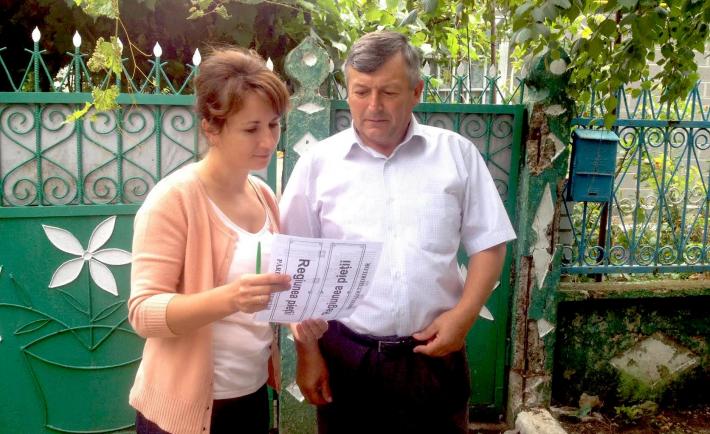
Grassroots party building participant distributes door-to-door questionnaires in Ștefan Vodă, Moldova
Around the world, public opinion polling reveals ever increasing levels of citizen distrust in traditional political parties. This distrust — coupled with fragile party connections with citizens — has increasingly resulted in losses in electoral support to populist forces and social movements that appear to be more responsive to citizens’ concerns. However, government’s ability to meet citizens’ expectations and deliver public goods relies heavily on political parties’ capacity to propose and implement quality, citizen-informed policies. To address these realities, NDI assists political parties to strengthen relationships with citizens, respond to their needs, deliver on campaign promises and improve public welfare.
Over the past decade, the Institute has implemented a wide variety of political party programs that include various aspects of policy development (e.g., conducting public opinion research to capture citizens’ concerns) in every region where NDI works. In Bosnia and Herzegovina, NDI helped internal party working groups to conduct improved citizen outreach techniques to inform policies. As a result, partner parties were able to institutionalize international best practices that allowed them to better identify local issues of greatest concern for national policy-making. In Morocco, a major party’s regional office developed the “Book of Women Empowerment” (or the “Pink Book”), a policy guide that addressed priority issues of Moroccan women. With NDI’s assistance, the party incorporated the Institute’s work in policy development, improved citizen outreach and the promotion of women’s political participation to develop the Pink Book.
NDI recently concluded research to capture successes and lessons learned in policy development programs across the Institute. Based on this research, here’s some of what we’ve learned:
- Capture parties’ perceptions on the risks and benefits associated with policy development: Across and within every political party, perceptions vary on the risks and benefits associated with policy development. To identify these risk and to address potential program challenges early on, engage parties on the internal challenges they face when adopting new practices. Conducting these exercises with partner parties not only allows programs to better tailor assistance to individual party needs, it may also help parties develop concrete strategies to mitigate perceived risks and address challenges to inclusive policy development practices.
- Keep policy development concepts and assistance as practical as possible: For any political party, policy development is a complex process. Programs can make policy development concepts and assistance more practical by providing hands-on assistance with extensive follow-up. For example, in Pakistan, the program mobilized 40,000 party members — especially women and youth — from 10 parties at the grassroots and leadership levels to work collaboratively in identifying policy priorities. As a result of hands-on practical assistance, partner parties produced 82 party specific policy proposals, some of which led to government action. Parties now have established internal party units and have utilized social media platforms to support policy development, and constituency and member outreach practices.
- More successful programs initially gained traction at the local level: Although a program’s success will depend on political party will, capacity and the political environment, more successful programs initially gained traction at the local level. For example, in Moldova, NDI established the Grassroots Party Building (GPB) initiative to assist local elected officials and party activists to employ and market new policy development approaches to party leaders. One of the more sweeping reforms occurred at the local level where a GPB group in Ștefan Vodă created a coalition within the local council. The Council developed and adopted a comprehensive five-year plan based on three years of constituent outreach conducted under the program. The GPB group then presented the plan to the full District Council, which the Council ultimately adopted.
During this crisis of citizen distrust, political parties in established and emerging democracies must adapt to citizens’ evolving concerns. Although transformative change is often a long-term goal, incremental change is possible. Parties can work towards this goal by adopting new and sustainable policy development practices to become more inclusive, responsive and accountable organizations. To build on parties’ ability to become more citizen-centered and policy-driven, programs should take these research findings into account when designing and carrying out programs.
NDI thanks the National Endowment for Democracy for their support in this research. The Institute is currently building on this research with funding from the United States Agency for International Development.
